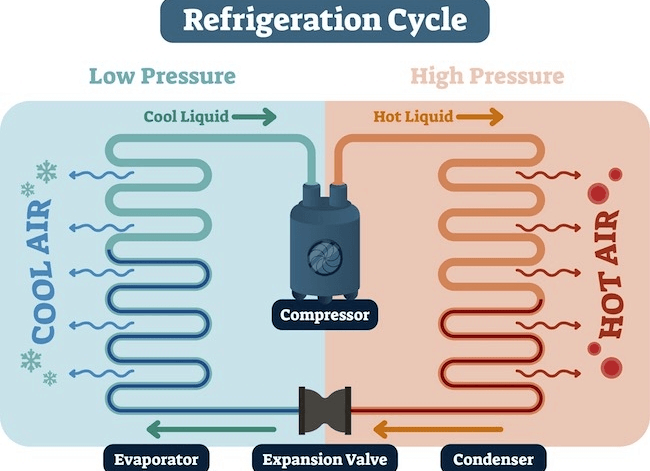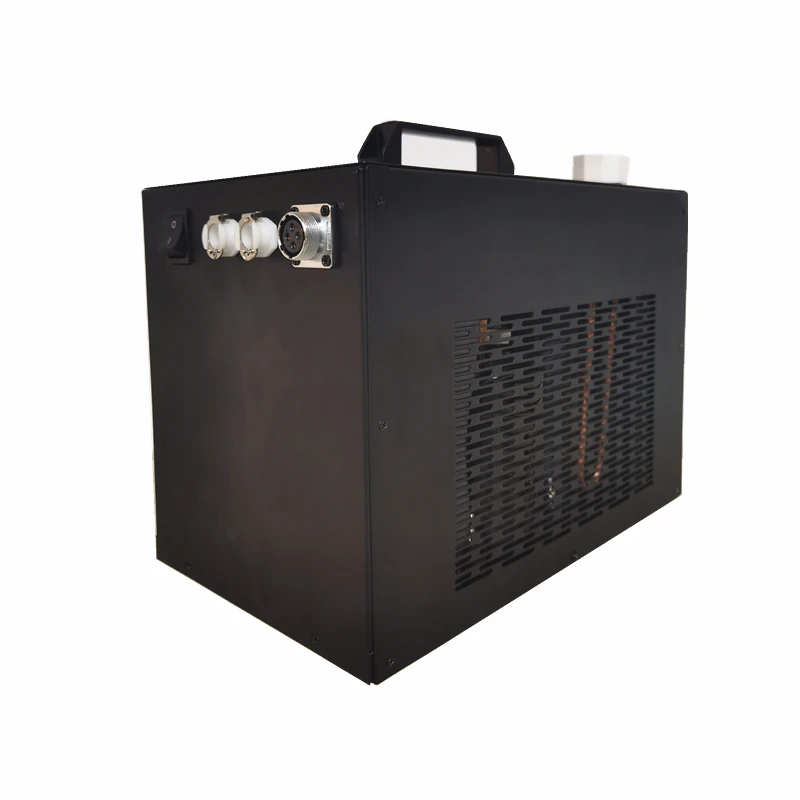Introduction

"RIGID is a miniature refrigerated compressor innovation leader in China. We keep looking for novel solutions in compact and portable cooling systems. We capture new technologies in mobile and compact cooling systems."
When it comes to cooling systems, water-cooled condensing units and air-cooled condensing units are two popular options. Water-cooled condensing units use water to remove heat from the refrigerant, while air-cooled units use air. Choosing between the two depends on various factors such as efficiency, cost, and environmental impact.
Understanding Water Cooled Condensing Units
Water cooled condensing units are designed to efficiently remove heat from the refrigerant using water as a cooling medium. These systems are commonly used in large commercial and industrial settings where high cooling capacity is required.
Exploring Air Cooled Condensing Units
On the other hand, air cooled condensing units utilize air to dissipate heat from the refrigerant. These units are more commonly found in smaller commercial or residential applications due to their simpler installation and lower initial cost.
Making the Choice: Water Cooled vs Air Cooled
Deciding between water-cooled and air-cooled condensing units involves considering factors like energy consumption, long-term efficiency, and overall performance in different environments.
What is a water-cooled condensing unit?

A water-cooled condensing unit is an integral part of a water-cooled air conditioning system that uses water to remove heat from the refrigerant. These systems are highly efficient in transferring heat and are commonly used in large commercial and industrial applications where air-cooled units may not be practical.
Efficiency of Water Cooled Systems
Water cooled condensing units are also favored for their ability to minimize noise pollution, making them an excellent choice for urban environments or areas where noise reduction is a priority. The use of water as a cooling medium allows for quieter operation compared to air-cooled systems, providing a more pleasant environment for employees and customers. This makes water cooled systems an attractive option for businesses looking to maintain a peaceful and comfortable atmosphere.
Components and Functionality
The key components of a water-cooled condensing unit include the compressor, condenser, and evaporator, all working together to remove heat from the refrigerant and circulate cool air throughout the space. These units are designed for durability and reliability, ensuring consistent performance under demanding conditions.
Water-cooled condensing units are known for their energy efficiency, which can lead to cost savings over time. By removing heat from the refrigerant and circulating cool air, these units help maintain a comfortable environment while keeping energy costs in check. Additionally, the durability and reliability of these units mean that they require minimal maintenance, further reducing long-term costs for businesses and homeowners.
Cost Considerations
While the initial cost of installing a water-cooled condensing unit may be higher than that of an air-cooled unit, the long-term operational cost savings can be significant due to their superior efficiency. Additionally, advancements in technology have made these systems more cost-effective to maintain over their lifespan.
Advantages of Water Cooled Condensing Unit

Lower Operating Temperatures
Water cooled condensing units offer the advantage of lower operating temperatures compared to air-cooled units. This is due to the efficient heat transfer process that takes place in water-cooled systems, resulting in better cooling performance and increased energy efficiency.
Additionally, water-cooled condensing units take up less space compared to air-cooled units. This is because water-cooled systems do not require large fans or bulky heat exchangers, making them a more compact option for cooling needs. The space efficiency of water-cooled condensing units allows for more flexibility in installation and can be particularly advantageous in environments with limited space.
Space Efficiency
Another advantage of water-cooled condensing units is their space efficiency. These units are ideal for installations where space is limited, as they do not require large amounts of outdoor space for air circulation like air-cooled units do.
Furthermore, water-cooled condensing units are also more aesthetically pleasing in urban environments where outdoor space is at a premium. With their compact design and minimal need for ventilation, these units can be seamlessly integrated into the existing infrastructure without disrupting the visual appeal of the surroundings. This makes them an attractive option for businesses and residential buildings in densely populated areas.
Environmental Impact
When considering environmental impact, water cooled condensing units have the upper hand. They use less energy and produce fewer greenhouse gas emissions compared to air-cooled units, making them a more environmentally friendly choice.
Benefits of Air Cooled Condensing Unit
Air cooled condensing units offer several benefits that make them a popular choice for many applications.
Installation Flexibility
One of the key advantages of air cooled condensing units is their installation flexibility. Unlike water cooled units, air cooled systems do not require a nearby water source for operation, making them suitable for a wider range of locations and environments. This flexibility allows for easier and more cost-effective installation, especially in areas where access to water may be limited.
In addition to their installation flexibility, air cooled condensing units also offer low maintenance and high durability. With fewer components and no need for a water source, these units require less upkeep and are less susceptible to corrosion or damage. This means that businesses can save time and money on maintenance costs, while also enjoying a longer lifespan for their air cooled systems.
Maintenance and Durability
Air cooled condensing units are known for their low maintenance requirements and durability. With fewer components and no need for water treatment, air cooled systems are generally easier to maintain compared to their water-cooled counterparts. Additionally, the absence of water circulation reduces the risk of corrosion and scale buildup, contributing to the long-term durability of the unit.
Furthermore, air cooled condensing units are cost-effective in terms of energy consumption. The absence of water circulation means that these systems do not require a separate water pump to operate, reducing overall energy usage. This can result in significant cost savings over time, making air cooled units a more economical choice for businesses looking to minimize their operational expenses.
Cost-effectiveness
In terms of cost-effectiveness, air cooled condensing units often prove to be more economical than water-cooled systems. The absence of water usage eliminates the need for costly water treatment and maintenance, resulting in lower operational expenses over time. Additionally, the simpler installation process and reduced maintenance requirements can lead to overall cost savings for businesses seeking an efficient cooling solution.
Furthermore, air cooled condensing units are often more space-efficient than water-cooled systems, making them a practical choice for businesses with limited space availability. This can result in additional cost savings by eliminating the need for costly structural modifications or additional construction to accommodate a larger cooling system. The compact design of air cooled condensing units also allows for greater flexibility in placement, providing businesses with more options for installation and reducing the overall cost of implementation.
Which is better air-cooled or water-cooled condensing unit?

When comparing the performance of air-cooled and water-cooled condensing units, it's essential to consider the different environments in which they operate. Water-cooled units are ideal for indoor settings and areas with limited airflow, while air-cooled units are better suited for outdoor use and open spaces.
Performance in Different Environments
Water cooled condensing units excel in enclosed spaces where air circulation is limited, such as industrial facilities or server rooms. The water-cooled system's ability to dissipate heat efficiently makes it a reliable choice for maintaining optimal temperatures in these environments. On the other hand, air-cooled units are more suitable for outdoor settings where access to water may be limited.
Water-cooled condensing units also have the advantage of being quieter than air-cooled units, making them a better choice for indoor environments where noise levels need to be kept to a minimum. This can be especially important in office buildings or residential areas where the sound of a loud air-cooled unit could be disruptive. Additionally, water-cooled systems are less affected by changes in ambient temperature, providing more consistent cooling performance in enclosed spaces.
Energy Consumption
In terms of energy consumption, water-cooled condensing units typically require less power to operate compared to their air-cooled counterparts. The consistent temperature of the water source allows for more efficient heat transfer, resulting in lower energy usage and reduced operational costs.
In addition to lower energy consumption, water-cooled condensing units also offer long-term efficiency benefits. The reduced strain on the system due to more efficient heat transfer can lead to a longer lifespan for the equipment, resulting in fewer maintenance and replacement costs over time. This makes water-cooled units a cost-effective and sustainable choice for businesses looking to minimize their environmental impact while maximizing operational efficiency.
Long-term Efficiency
When considering long-term efficiency, water cooled condensing units have an advantage due to their ability to maintain consistent operating temperatures regardless of external factors. This stability leads to extended equipment lifespan and reduced maintenance requirements, making them a cost-effective choice over time.
Water cooled condensing units also offer energy efficiency benefits, as they can operate at lower condensing temperatures compared to air-cooled units. This means less energy is required to maintain the desired operating temperature, resulting in cost savings over time. Additionally, the consistent temperature control provided by water cooled systems can lead to improved product quality and reduced spoilage in refrigerated environments, further adding to their long-term efficiency.
RIGID - Innovating the Future of Cooling Systems

Introduction to RIGID
RIGID is a leading innovator in the micro cooling industry, specializing in mini compressor technology and compact cooling systems. With a focus on B2B solutions and customization, RIGID offers superior design and uncompromising quality to meet specific client requirements.
Mini Compressor Technology
RIGID's mini compressor technology is at the forefront of innovation, providing efficient and reliable cooling solutions for various applications. This advanced technology allows for space-saving designs and high performance, making it an ideal choice for water cooled condensing units.
B2B Solutions and Customization
RIGID works closely with clients to develop custom-made refrigeration solutions that align with their specific needs and budgets. With a commitment to boosting client competitiveness, RIGID offers tailored B2B solutions that prioritize efficiency, reliability, and cost-effectiveness.
Now that we've explored the benefits of both water-cooled and air-cooled condensing units, it's clear that RIGID's innovative approach to cooling systems sets them apart in the industry. By prioritizing B2B solutions, customization, and advanced mini compressor technology, RIGID continues to lead the way in providing efficient and reliable cooling solutions for various applications.
Conclusion

Making the Informed Choice
When considering whether to invest in a water-cooled condensing unit, it's essential to weigh the benefits of lower operating temperatures, space efficiency, and environmental impact against the cost considerations. Similarly, for air-cooled units, installation flexibility, maintenance and durability, and cost-effectiveness should be carefully evaluated.
Factors to Consider
Factors such as performance in different environments, energy consumption, and long-term efficiency should guide your decision-making process. Additionally, it's crucial to consider the overall cost of ownership and the specific requirements of your cooling system before making a choice between water-cooled and air-cooled condensing units.
Embracing Innovation with RIGID
As a B2B solution provider in the micro cooling industry, RIGID offers innovative mini compressor technology that is perfectly suited for water-cooled condensing units. With a focus on custom-made refrigeration solutions and meeting specific requirements of clients' budgets, RIGID is at the forefront of driving competitiveness in cooling systems.
In conclusion, making an informed choice between water-cooled and air-cooled condensing units requires careful consideration of various factors such as efficiency, cost-effectiveness, and long-term performance. By embracing innovation with RIGID's mini compressor technology and customized solutions for B2B applications, businesses can optimize their cooling systems for maximum effectiveness while staying within budget constraints.